#also the resolution/redemption
Explore tagged Tumblr posts
Text




...buttefly!Chloe?
#omg the last one holy shit#my art#miraculous ladybug#md concept#kwami swap#chloe bourgeois#nooroo#butterfly!chloe#butterfly miraculous#cant remember if i have a name for her or not#man this could be such an interesting combination#like it would make sense with her motivation#(attention and if she knows about the wish then a family which loves her (yikes))#the execution#(irregular schedule and just normal people getting akumatized. not criminals)#also the resolution/redemption#(realization that she doesnt need to do this + finding friends and family among the heroes)#it could also lead into a bigger threat of ...idk i havent thought that far tbh#but yeah#and also just nooroo appearing more often and trying to help her#i keep putting her into corsets for some reason
228 notes
·
View notes
Note
"he's my brother. he already hates me forever." aughhfhhhgggg i need to lie down.......
I KNOOOOOOWWWWW
it’s been on my mind for weeks its so fucking sick and twisted. everyone bow down to kara or like pray on her downfall for saying something so so so awful and devestating .
just the concept of the black brothers and their lack of communication and how it’s probably too late and they’re just too old now to actually genuinely start over. something about how they still want to be in each others lives but it only works if there’s more distance than not between them…,,, makes me SICK. and they love each other so much!!!!! but they don’t know how to be kind to each other or how to be friends or how not to look at each other without seeing their parents . its HARD to be with each other for too long because it brings back things they’re trying so hard to forget and move on from . when the person you love the most is the one you can’t stand to look at
#the au i was talking about has regulus studying abroad and meeting remus#and sirius comes to visit#and everything just collapses#and they both regress into who they were in that house#and its not something sirius would do to a friend but he does it to regulus but he loves regulus more than anything and there’s no-#resolution and no redemption#and all regulus can do is never forgive him and not talk to him for a year before they go back to normal and never mention it again#i also have an au with lesbian fwb lilypad and regulus stealing her away#its a whole thing#just something about them being brothers and resenting each other and wanting what the other has and being nasty to each other in a way-#they cant be to anyone else#but its also about love and guilt and regret and self hatred and the broken strings between them#ANYWAY!#asks#mil tag#black brothers
10 notes
·
View notes
Text
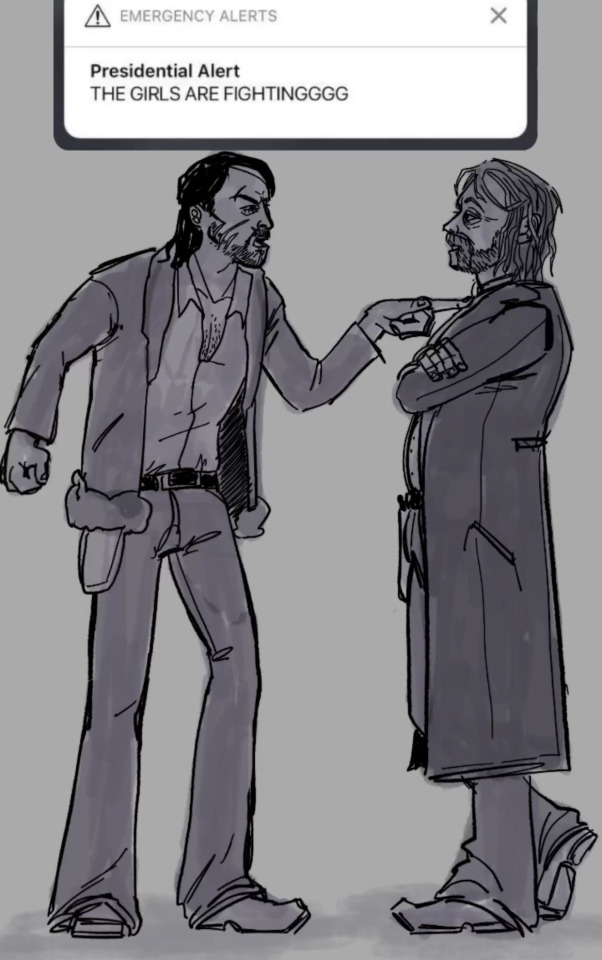


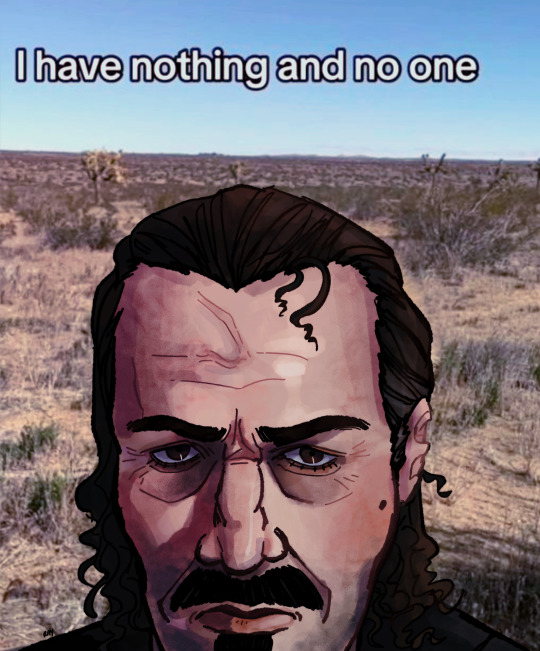
i love the part in red dead redemption 2 when dutch said “it’s time for red dead redemption” and then red dead redemptioned all over the place
#sorry. the worms. they got to me. the brain#please tell me you understand my obsession#also its so funny to draw distressed dutch. its soul nurishing to make him vexed#me.txt#red dead redemption 2#PLS CLICK ON THE IMAGES FOR BETTER RESOLUTION#red dead redemption fanart
5 notes
·
View notes
Text
There’s no part in the ending of the Hunting Dogs arc that is good, actually
#in all seriousness. I just sat here thinking about it. me myself and I having a meeting like what the hell we gonna do. because messages ar#being sent with themes that are being shown and yeah no. it could and might pick up turn around and be better in the future but this could#also be the beginning of the end. no this isn’t just about the ‘Chuuya never was a vampire’ thing I mean the whole arc like it’s going with#the anime ending and the whole Fukuchi Fukuzawa resolution was not it. that analysis I reblogged earlier said it best. the freaking status#quo for whatever reason just has to be maintained. And Dazai is always a super genius who knows everything and even when he’s doing wrong o#no he’s not actually. Like what’s the point of his redemption arc that’s still ONGOING if he’s not allowed to progress further because the#narrative rewards him for where he’s at as if he’s at the end of his redemption arc fffff. this Rant got really random but I just want to#say that it’s actually perfect in a way because of how it relates to my fanfic on a meta level but that’s for another day#my complaints#✦.˳·˖✶ ‧₊˚✧𝖘𝖈𝖗𝖊𝖆𝖒𝖘 𝖎𝖓𝖙𝖔 𝖙𝖍𝖊 𝖘𝖙𝖆𝖗𝖗𝖞 𝖛𝖔𝖎𝖉✧˚₊‧✶ ˖˳.✦
2 notes
·
View notes
Text
still trying to decide if i'd add canon characters or not to my multi (yes it is happening)
#i honestly hate their canon stuff#some more than others y'know#so it'd be pretty much like making them my ocs#also not sure if i'd add the g.enshin ones#bc they are the ones i'd pretty much rewrite the whole character#r.aiden and g.anyu to those who are curious#they'd still be the same characters in essence but i feel like they lack some the oomf other characters got#specially g.anyu she's just there in the story#r.aiden has a lot more care into her but i dont like the resolution of her character arc#bla bla bla good ppl do evil things out of love bla bla#let her be an asshole pls she doesnt need a redemption#anyways the only canon muses i'd add are from g.enshin and h.sr#bc im insane like that in case you couldnt notice
1 note
·
View note
Text
How To Plan A Book Series: Ultimate Guide
Writing a book series can be an incredibly rewarding experience for authors, but it also requires careful planning and execution. A well-crafted book series can captivate readers, build a loyal fan base, and provide a steady stream of income for writers. However, planning a successful book series is no easy feat.
It demands a deep understanding of world-building, character development, and plot progression. In this ultimate guide, I'll help you explore the essential steps to help you plan a compelling and cohesive book series that will keep your readers hooked from start to finish.
Develop a Compelling Premise The foundation of any successful book series is a strong premise. Your premise should be unique, engaging, and have the potential to sustain multiple books. Consider exploring a complex world, a captivating concept, or a character with a rich backstory that can evolve over the course of several books. Ask yourself: What makes your premise stand out? What will keep readers invested in the story for multiple installments?
Create a Detailed Outline Before you dive into writing, it's crucial to create a detailed outline for your entire book series. This outline should include the overarching plot, major story arcs, character development, and key events for each book. Having a solid outline will help you maintain consistency, avoid plot holes, and ensure that each book contributes to the overall narrative. Don't be afraid to make adjustments as you write, but having a roadmap will keep you on track.
World-Building: Crafting a Vivid and Consistent Universe One of the hallmarks of a successful book series is a richly developed and immersive world. Whether you're creating a fantasy realm, a futuristic society, or a contemporary setting, pay close attention to world-building. Establish the rules, customs, histories, and geography of your fictional world. Consistency is key, so ensure that the details align across all books in the series. Consider creating a "bible" or a comprehensive guide that outlines the intricacies of your world, making it easier to maintain continuity.
Develop Compelling Characters Great characters are the heart and soul of any book series. Your protagonists, antagonists, and supporting characters should be well-rounded, multi-dimensional, and undergo significant growth and transformation throughout the series. Craft backstories, motivations, flaws, and strengths for each character, and ensure that their actions and decisions drive the plot forward. Remember, character development is an ongoing process, so be prepared to explore new facets of your characters as the series progresses.
Establish Recurring Themes and Motifs Themes and motifs are powerful tools that can add depth and resonance to your book series. Identify the central themes you want to explore, such as love, redemption, power, or identity. Weave these themes throughout the series, allowing them to evolve and deepen with each installment. Motifs, like recurring symbols or imagery, can also create a sense of cohesion and add layers of meaning to your narrative.
Plan for Cliffhangers and Resolutions One of the key strategies for keeping readers engaged in a book series is the strategic use of cliffhangers and resolutions. Cliffhangers create anticipation and leave readers craving for the next installment. However, be cautious not to overuse this technique, as it can become frustrating for readers. Balance cliffhangers with satisfying resolutions that tie up loose ends and provide a sense of closure, while still leaving room for the story to continue.
Consider Pacing and Narrative Structure Pacing and narrative structure are crucial elements to consider when planning a book series. Each book should have its own narrative arc, with a beginning, middle, and end, while also contributing to the overall story progression. Vary the pacing between books to maintain reader interest, alternating between action-packed and slower, more introspective sections. Experiment with different narrative structures, such as multiple perspectives, non-linear timelines, or frame narratives, to keep the series fresh and engaging.
Manage Continuity and Consistency As your book series grows, maintaining continuity and consistency becomes increasingly important. Keep detailed records of character descriptions, plot points, world-building elements, and timelines. Regularly refer back to these notes to ensure that you're not introducing contradictions or inconsistencies. Consider creating a series bible or a wiki to help you keep track of all the moving parts.
Plan for Character Growth and Evolution In a book series, characters should undergo significant growth and evolution. Plan for character arcs that span multiple books, allowing your protagonists and supporting characters to face challenges, make difficult choices, and emerge as changed individuals. This character development will not only add depth to your narrative but also keep readers invested in the journey of your characters.
Anticipate and Address Potential Plot Holes As your book series expands, the potential for plot holes and inconsistencies increases. Be vigilant in identifying and addressing these issues during the planning stage. Regularly review your outline and notes, looking for any logical gaps or contradictions. Enlist the help of beta readers or critique partners to provide fresh perspectives and catch any potential plot holes you may have missed.
Consider the Overarching Story Arc While each book in your series should have its own narrative arc, it's essential to plan for an overarching story arc that spans the entire series. This overarching arc should tie together the individual books, building towards a climactic conclusion that resolves the central conflict or mystery. Ensure that each book contributes to this larger narrative, advancing the plot and raising the stakes for the characters.
Plan for Marketing and Promotion Finally, as you plan your book series, don't overlook the importance of marketing and promotion. Develop a strategy for building buzz and engaging with your audience throughout the release of each book. Leverage social media, author events, book tours, and other promotional opportunities to keep your readers excited and invested in your series.
Remember, writing a book series is a marathon, not a sprint, so be prepared to invest time, effort, and dedication into crafting a truly remarkable literary journey. Hope this helped!
Happy Writing - Rin T.
Hey fellow writers! I'm super excited to share that I've just launched a Tumblr community. I'm inviting all of you to join my community. All you have to do is fill out this Google form, and I'll personally send you an invitation to join the Write Right Society on Tumblr! Can't wait to see your posts!
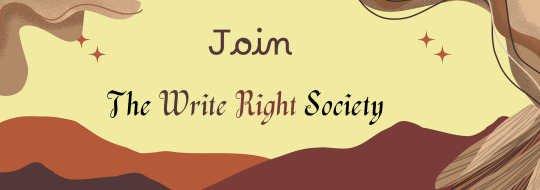
#creative writing#thewriteadviceforwriters#writeblr#on writing#writing#writers block#writers on tumblr#writing tips#how to write#writers and poets#writing advice#writing resources#novel writing#writing blog#writer#writer stuff#writerslife#creative writers#helping writers#writersociety#writerscommunity#resources for writers#ao3 writer#female writers#book series#book review#booklr#booktok#books and reading#fantasy fiction
3K notes
·
View notes
Text
I want to speak about why the second part of the Best-True ending of Dragon Age Veilguard pierced me so deeply. The Flycam screenshots are from Aru/Elf botanist (YT linked at the bottom).
To set the tone, the music established the emotive themes of the scene. It speaks to the Lost Elf theme- however it is forever changed and lighter. This elf that was Lost for so many years is now Found. There is hope in the strings, there is redemption in each note. This also speaks to the specific codex from the lighthouse in Solas’ secret room. Not his office at the top of the building, extravagant, beautiful, overshadowing all others and looking down in godly benevolence - his private quarters on the main floor, where parts of his travel with the Inquisition surround him.

When Lavellan speaks to Solas, she is using a resolute voice, almost chastising him for thinking he has to do this alone. He has her, and she will keep reminding him.
*Edit: Please note she also speaks the common tongue in this instance.

Solas implores her to think of the dangers the journey he is going on will have, his head is down to show the residual shame and his plea for her safety. But also a part of him hopes. The reason all he says is that “there will be danger” is a statement of warning but not fully entreating her to stay. His heart has a pause, he is prioritising her safety and wants her aware of the dangers.
Note, that he also speaks in Elven in response to her, his first language and mother tongue. As a trilingual, one usually reverts to their more natural tongue during a heightened emotional situation - in this case, Solas' warning statement is also a subconcious plea for her to understand him and join him despite the danger. He will never push her further than she wants to go like he was pushed by Mythal.
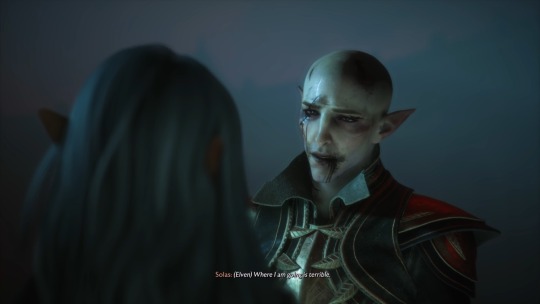
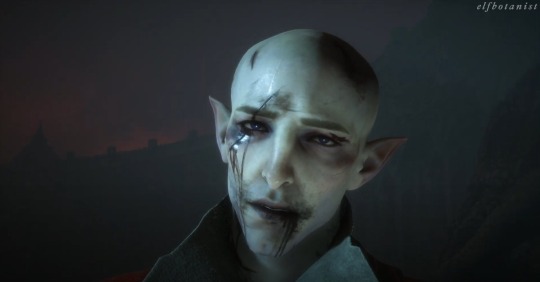
This is the shot normally, the downward and side tilt are clear making the imploring effect of his words resonate further. Unlike before where he only looked at her for small spans of time his attention is fully focused since being absolved of his duty. After she responds that she will be with him, forever no matter what, he shifts. This is akin to when making vows “I stay with you in sickness and in death” but they are crossing the boundaries of mortality. This is “I stay with you in any plight, any condition, any reality. I commit my eternity to you”
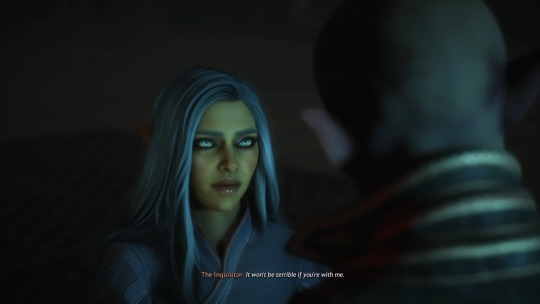
Her response is an amalgamation of the following:
1) You are not alone in it emotionally and mentally as I am with you
2) Physically I am with you to endure it with you
3) Our joined manifestations will make it a better place quite literally, so the bleak darkness that could have encroached will not exist when we are together
This is also validated a bit by Trick Weekes QA:
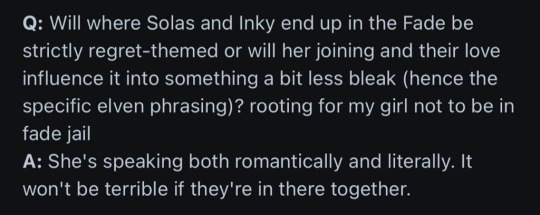
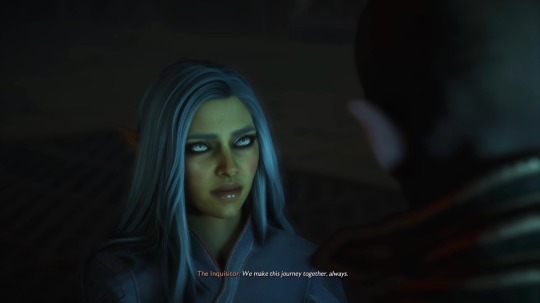
She then states their love is eternal, and she chooses to walk on any path with him fully and wholly. A love that transcends time, mortal barriers, immortality, the different realms of existence. This combined with their standing pose as if at the altar of a wedding is the final part of her vows. Said in the same hallelujah pattern and in elven as he would speak - she commits to his language (mentally and emotionally) so he best will understand her declaration. (This is confirmed by @northgalis on Twitter).
This, in front of the witnesses who are the allies who helped them unite in their union, Rook and Morrigan whilst overseen by the Veil itself in the position of holiness. His blood is the bond they now share, the new blood magic in a way that ties them to a new fate of their own making. The veil that brought them together in the beginning of the journey they now tread into together.
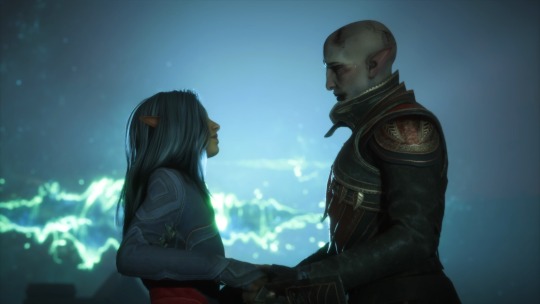
Then they confirm their vows with a kiss, she pulls him in first, similarly to their first kiss in the fade and he reciprocates. Solas is weakened, hurting, feeling unworthy of the brightest soul in the universe but she chooses him and he finally submits to his desire and need for her. His duty now to himself, atonement and the woman who chose him with it all in mind.
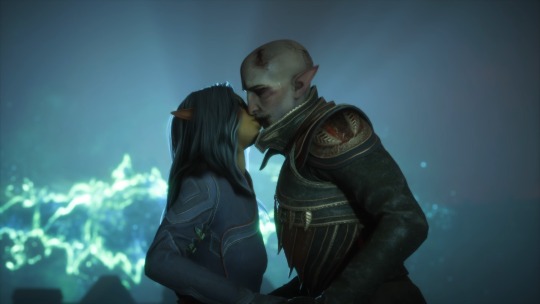
Aru’s flycam footage also shows the kiss being deeper and him actively
After the kiss, he SMILES. The ending is now so much less bleak it is tender, it is soft it is comfort, it is peace.
A smiling glance. meeting at a crescendo; a shared moment of understanding;

Screenshot from Daoithe on Tumblr.
He then proceeds to thank Rook, for helping him see when he allowed himself to be so plagued by grief and guilt and not giving up on him as it could have turned to despair, revenge and anger, like all the other endings which I hate because they go against his very nature. The other endings spit in the face of his complexity the story keeps explicitly imploring you to see and have empathy. Solas is a spirit of wisdom, when guilt festers that wisdom manifests in the worst possible ways. And with no one to listen and read between the lines, the fate he is subjected too is far too unkind. But here, he not only is freed of his guilt but also, just as importantly and very implicitly, his fear of dying alone.

If you have played inquisition you will recall there is a moment near the climax of Here Lies the Abyss where Inquisitor and their chosen companions go into the Fade. Solas is easily one of the most fascinating and best companions to take with you as he from the onset has been a “Fade expert” and his lines throughout are intriguing and educational. During the quest you come across graves embodying the different characters biggest fears. And Solas? Dying alone. The god who went against everyone he knew for a better world, whose empathy only continued to hurt him and freed others with hopes to better the world is the most lonely man. And he is terrified and within himself brought low by his loneliness in his commitment to the path he feels he must take. This is why the next part transcends the scene.
After the kiss which confirmed their bond and pact - binding them together with love and empathy, wisdom and curiosity married - he thanks rook and looks back at Lavellan, his Vhenan. And it is a *micro second* shot that completely defeats me. His head held high, the concerned imploring tilt gone as he holds his chin higher in appreciation, respect and awe for the woman who chose him. The love of his life, his eternal companion. The only one to truly fully see him, respect him, and love him wholly. Who has forgiven him and chooses a path which only leads to him. He is honoured to be loved by her, and will work to be the better man he feels she deserves, but also beginning to accept that her love for him is in any form he takes. The one he prizes above all others, chose him, and he will never be alone - and that is everything.
Seeing completely, and being wholly seen.
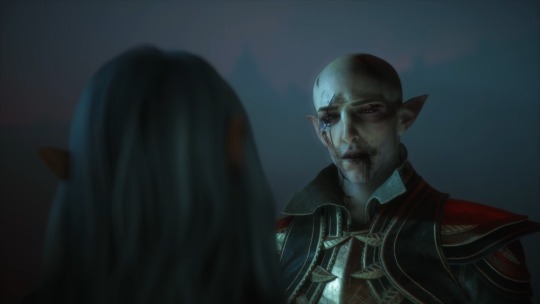
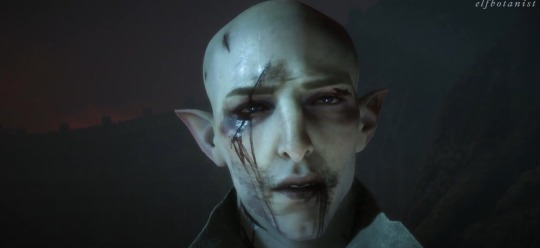
This scene literally destroyed me in the best way. I am left hollow with love and adoration for this character and his relationship to his love Lavellan and no other romance will meet the threshold they have created for me. It is not Solavellan hell no longer, they have transcended to Solavellan heaven.
My playthrough video of the second half of the ending sequence.
Here is Arus Flycam YT video for reference:
Arus Flycam Lavellan POV of the True - Best ending
youtube
#Youtube#Solas#Solavellan#dragon age solas#solas dragon age#solas dread wolf#solas x inquisitor#lavellan#solas x female lavellan#Solavellan heaven
662 notes
·
View notes
Text
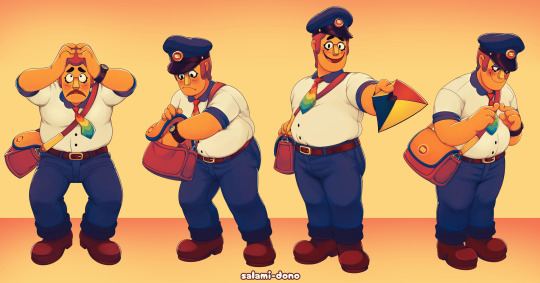

It's Eddie Dear. I have a lot to say about Mr. Dear here.
First off, I wasn't sure how to present them in a post, so I just lined them up all together. I could post them separately, but the resolution wouldn't be any better. If you don't know about the Welcome Home project, you should look it up! Support Clown if you end up liking it.
The Big Challenges here (➡🐊⬅) were keeping all of the images consistent and, of course, coloring all of them the same way. Oh, what a nightmare! I also tried another new thing. Most of the coloring was done on one layer. The exceptions were the hats and rainbow neckties. Oh, and the envelope.
It was worth the trouble, he said, grinding his teeth.
All of the poses were referenced from the animations of Bobby Fulbright from Ace Attorney - Dual Destinies. He is one of my favorite characters. He's cute, he's funny, and I admire his passion for justice. (🚨Do NOT look up Bobby Fulbright if you'd like to play Ace Attorney spoiler-free.)
Eddie #1: Oh, Dear! Eddie's lost his hat! He can't deliver mail without his hat! Won't you help him find it, neighbor?
That's... kind of the idea for the first Eddie. It reminded me of a funny childhood memory. I stole my uncle's hat and he pleaded for me to return because it was "the source of his power." Obviously, I had to keep stealing it after that. He pretended to wither away and die if his hat wasn't returned. haha
I'm done! If you'd like, I could tell you a little about Bobby Fulbright and his partner, Simon Blackquill. It won't be a great description. If you're an Ace Attorney fanatic, you're not allowed to correct me!!! You can, however, tell me how diabolical I am.
Bobby Fulbright is a police detective and a self-proclaimed champion of justice. He acts like a superhero. He even has a catchphrase! It's, "In justice we trust!" In Japanese, it is simply, "JUSTICE~!" He has a friendly, honest, and bold personality.
He's also very loud.
Mr. Fulbright was assigned to Simon Blackquill, a cold-hearted killer with a tear-stained face. They call him the Twisted Samurai. He worked as a prosecutor while serving time. Prosecutor Blackquill constantly barked orders at the half-witted detective. Fulbright seemed unfazed by his insults, manipulation, and intimidation. Despite his past, Detective Fulbright fully believed in Blackquill's redemption and eventual return to society.
It was said that they worked in-sync in the courtroom.
I'd better stop there. You see? He's not at all like Eddie. 🤣 Thank you for reading!
3K notes
·
View notes
Text
Actually, no. The shippers in the 911 fandom who primarily complain about Tommy and his past don't actually care about Tommy's past or his actions that contributed to the previous toxic workplace environment and harassment at the 118. Not everything is about a fucking ship, believe it or not, yet the only time they bring up his behavior is in relation to shipping. And because the only time they bring up a valid critique of Tommy's character is during shipping "discourse," I'm convinced it's not brought forth in good faith. Finding a way to tie everything to a ship—especially things like racism and misogyny—is cheap and tasteless. Not everything is about "shipping;" shut up about the shipping.
I don't think they actually want to discuss how white queers contribute to the marginalization of others, including other queer people, by weaponizing the patriarchy and/or white supremacy in their favor because so many of them are fellow white queers themselves. They don't care about how Tommy inadvertently, because of his past, provides a realistic portrayal of how white queers divide or hurt the larger community because of an inability to find solidarity with people of a different background, culture, or race (especially if it would "inconvenience" them or if it does not directly benefit them, like Chim saving Tommy's life). White people would rather choose misery and isolation over standing with or up for non-white people. White people are generally not willing to put in the work to build community; they'd rather contribute to the system or fly under the radar to avoid being shunned by the structures they, and the Ol' Boys Club, benefit from, like white supremacy or the patriarchy. Most white queers would rather be complaisant, complacent, and complicit. It's the white queer's adherence to oppressive systems that divide the community, not people's calls to tear those systems down. And it's only the white queer who can change their perspective on this.
Tommy only has himself to blame for his jealousy and alienation from a supportive and familial community, and only he can take the steps to ameliorate the situation. Tommy was an absolute fucking dick to Chim and Hen, and that has had long-term consequences on his life. Only he can correct for his behavior. He contributed to a toxic work environment, referring to Chim as a Chinese takeout delivery man, actively participating in Chim's hazing, and telling Chim that he did not like the man (mostly because he didn't know him). He would later call Hen "bitchy," and the men of the 118 would leave the "domestic work" to her as they did Chim, actively contributing to her hazing. He did not (verbally) stand up for her, iced her out, and also contributed to a homophobic work culture that made same-sex attraction the butt of jokes. He contributed to this toxic culture to fly under the radar, and that directly hurt people he should have extended a hand to.
Unfortunately for most of the fandom, this is, ultimately, a show that loves stories about redemption and resolution. And there is actual, explicit (meaning, non-subtextual) evidence that Tommy has put in some work to remedy what he did and who he was (including being able to 1.] own up to his past actions, 2.] understand how he hurt others, 3.] recognize why he did what he did and how that it is an explanation, not an excuse, and 4.] begin to make amends or rectify the situation, like reporting Gerrard and changing his mind about Hen and Chim). Hen and Chim would not have invited him for drinks regularly if they thought he was "irredeemable." The 118 would not have thrown him a going away party if they disliked him. Chim would not call in favors from Tommy on more than one occasion or even describe him as "so cool" if they weren't—well—cool. Eddie wouldn't enjoy ring-side fights and basketball games with Tommy if he didn't enjoy the man's company. Tommy also clearly refers to the type of man he was in the past tense, implying change over time. It can be argued that he has not put in enough work, but that's not what's being argued. We're getting bad faith arguments that Hen, Chim, and Eddie hate Tommy or bad faith arguments where Tommy's past actions are only brought forth as some sort of "gotcha" when a fan prefers canon representation over homophobic fan fiction tropes. You don't have to like Tommy, but making up non-textual reasons to dislike him is absurd.
Tommy, as a character in a narrative, provides a lesson for the general audience (GA), the majority of whom are white. It's not just important to see queer people on screen; it's important to see white people learn and change and admit they were wrong. It's also important that the show—well—shows the GA that whiteness and man-ness affect people's perception, position, and treatment. Tommy isn't just a gay man; he is a white gay man, and this has had a direct impact on how he navigates the world and how the world interacts with him. Gerrard treats men like Sal and Tommy differently than men like Chim or women like Hen, and staying in Gerrard's good graces—like the good graces of oppressive power structures—requires one to conform to a very narrow definition of a "real man," like being straight, white, palatable (like... not kinky, not risqué, not queer, all the things the fandom seems to actually hate Tommy for), and not helping oust regressive figures from positions of authority for the way they treat your coworkers. The audience got to see how Tommy went from being the prodigal son to being openly mocked by men like Gerrard. And it's important to show the GA that someone can and will be happier if they go against the grain and that admiration from men like Gerrard means very little in the grand scheme. Tommy is happier now after having been "rebuked" by men like Gerrard than he was when he strove for their praise and acceptance.
It's also important to show that men like Gerrard and his beliefs belong in the past, even though they exist in the present. This is a network TV show. A non-zero number of men like Gerrard catch this show weekly. It is still important to show that Gerrard is not the "type" of man anyone should aspire to be. His beliefs and actions are not commendable, and the show is very heavy-handed about this. The show is going to once again compare Gerrard ("bad captain") and Bobby ("good captain") to show how Bobby has created a good legacy at the 118. It began this parallel with Bobby Begins Again, continued to reinforce Bobby's good legacy in Buck's coma arc, and then revisited how Bobby has had a positive influence on the lives of the 118 in his season 7 montage. Now, the show is going to compare and contrast him and Gerrard to reinforce how important Bobby is to those around him. The show will also continue its inadvertent parallels between Buck and Tommy, showing how Buck is a different man under similar circumstances because he has had good influences (re: Bobby, Hen, and Chim) in his life. Buck and Eddie's relationship was shaping up to be very similar to Tommy and Chim's relationship: oppositional because of one-sided disregard and dislike, but it didn't because they had a good influence: Bobby (given the rather... fucked timeline, Tommy was likely newer to the 118 when Chim joined and, like Buck, his hostility and posturing were also likely influenced by insecurity and a desire to secure his position at the table).
Most unfortunately for many, the show is also going to show how Tommy has changed due to the same influences (re: Bobby, Hen, and Chim). They wouldn't have re-introduced both Tommy and Gerrard and mentioned their dynamic on more than one occasion if they weren't going to do something with that. Season 7 set up Tommy's upcoming arc very nicely. He knows the man he was, he knows the man who shaped him into that, and he knows how and why that was wrong. We'll get Tommy confronting his obvious daddy issues, jealousy, and desire for community (and why he didn't get a family-like dynamic at the 118, re: Gerrard *and* Tommy's own behavior). Tommy has been explicit about this, literally telling Buck that he envies the relationship the people at the 118 have and mentioning that he was not a good person, and this played a part in why he didn't have the same rapport.
9-1-1 is not a perfect show, but it does reflect some of the positive changes of our time. It's important to see representations of comp-het—like Buck, Tommy, and Michael—and how it negatively impacts people's character or relationships, and then how they—the character—can amend that. It's important to see stories that depict how silence is complicity and how refusing to be silent—as Hen refused to be—makes change and changes minds. It's important that the show reminds the audience that Hen is a black lesbian and that this has impacted how people see her and treat her, but that she is just as capable, if not more so. This includes men like Chim. Because I see nearly none of the people who "critique" Tommy in the name of "shipping" ever bring up how Chim has leaned on the patriarchy for support and a position at the table. He may have been the kindest to Hen, but he was by no means normal about women. And it is important to see how non-white men benefit from the patriarchy even as they are victimized by white supremacy. It's also important that the show shows the GA that non-white men are not affected by white supremacy equally, as Michael and Harry have had discussions about blackness and police brutality, a conversation that Chim is never going to have to have with his children, but that doesn't mean that Chim won't have to one day have a discussion with Jee-Yun about how and why some people treat her differently.
But the fandom approaches everything in a very... Catholic way. They don't approach this from the view that people can change and should be pushed to change; rather, they shun people like they've been marked by original sin. The structures we live under have deeply affected each and every one of our worldviews. "You are not immune to the propaganda" includes your personal philosophies and ideologies as well as the things you were taught since you were a child, consciously and "subconsciously." But, people would rather condemn everyone else as "irredeemable" than look critically at their own behavior out of fear of being "one of the bad ones." They'd rather *not* accept the fact that everyone has learning and changing to do as that would reflect upon them, too. This leads to being very resistant to being told that you're mistaken, you've hurt others, or that your behavior and beliefs contribute to repressive, dangerous, or toxic ideas (and we've seen a lot of that; y'all do not create safe online spaces). This leads to a lack of personal change as well as a lack of change at the interpersonal level because rather than teach or challenge, they stick up their nose and turn the other way. "Their barbaric bigotry; my enlightened neglect."
So, really, they've learned nothing from a character like Tommy.
592 notes
·
View notes
Text
I have seen some critique of peoples Caitlyn critiques cuz many people hating on Cait also like Silco. Cuz how can you hate one but like the other when they both have some similar themes about being driven to do unjust things for just reasons? And I do see the hypocrisy that comes across by disliking Cait’s character in s2 and then liking Silco. I think there is a valid critique there.
However, there is a difference between the way the narratives of s1 and s2 respectively handle these characters and their actions.
We actively see the harm Silco’s actions cause and we see the benefits (almost getting Zaun independence) and the audience is left to interpret to what extent Silco was justified or not. The narrative in s2 does let us contemplate how much of Caitlyn’s actions were justified, however we are not rlly shown the harms of her actions (gassing Zaun and hitting Vi) and these actions literally have no affect on the plot, indirectly implying that they rlly weren’t a big deal. Also, cuz of fast pacing we don’t have a lot of time to even sit with the fact that these things occurred (especially cuz they have no impact on the plot).
The most important difference tho is that s1 never tries to portray Silco as “redeemed”, or that he is even capable of redemption. His “you’re perfect” line isn’t supposed to make us think that all he did is forgiven. We see his character. We understand his logic and thinking and why he does what he does, and we are left to our own conclusions about how much of a villain he was.
But by the end of s2 we are clearly supposed to have forgiven Caitlyn because she gets with Vi in the end. Because Vi has forgiven Caitlyn the audience clearly is supposed to as well despite the narrative not doing enough to make this arc and development feel cohesive and earned.
The narrative of s2 purposely leads you to a certain opinion of Caitlyn in a way that I’d argue s2 rlly doesn’t do with Silco. Yes, they are both characters that are motivated by revenge and hatred to do unjust things for the right reasons. But s2 clearly wants us to forgive one character, while s1 never asks us to.
(And in my opinion s2 rlly doesn’t do enough for me to understand why Vi and her would reconcile, cuz they don’t let Vi rlly hold a justified grudge against Caitlyn so that their reunion and reconciliation can be simple and quick).
In the end, like most of my issues with s2, it doesn’t let us explore these nuances enough for me to feel the themes they are going for were cohesive amongst all that was happening and thus nuanced redemption arcs like Caitlyn’s feel unearned. Which is a major problem if the final happy ending of the show is a couple getting together when their resolution to their issues feels cheap, unearned, and unexplored in many ways.
#I’m wouldn’t say I’m firmly anti caitvi or Caitlyn just disappointed with how the writers handled them but I’ll use the tag anyway ig#anti caitvi#arcane#arcane critical#arcane silco#silco#arcane caitlyn#caitlyn kiramman#paracritical#paranalysis
124 notes
·
View notes
Text
I think alot of people like the Batfamily— because the dynamics are so flawed. Especially when it comes to Bruce. It's SO rare to see dysfunctional families in media and its even rarer to explore the trope without a clear resolution. The diffrent writers and interpretations have created a behemoth of a family dynamic.
They are messy and they stay messy but that doesn't mean they don't try.


When it comes to Bruce the man is a walking contradiction. Protector vs. Prosecutor. Father vs. Mentor. Batman vs. Bruce. There are a thousand different reflections of him as a character.


His obsession with justice clashes with his ability to connect emotionally—leading to strained relationships marred by both unhealthy expectations on all sides but also this overwhelming need to protect.
It's fascinating and from a psychological standpoint it definitely speaks of Ambivalence and some form of Cognitive dissonance. I think the man is in alot of perpetual internal conflict about his beliefs and actions.


This creates a pattern of thought that seems contradictory, but to Bruce it makes perfect sense; he often rationalizes his absence from family life by convincing himself that his role as a protector justifies the sacrifices he makes. The same with certain actions we as readers see as 'inexcusable' for example take Gotham war.
In another instance, his complex feelings toward Damian—who embodies both the potential for greatness and the risk of darkness.


Ultimately, Bruce's journey as a dad for me—reflects his struggle to balance his dual identities, the man both seeking redemption through his children while also grappling with his past and what made him Batman in the first place.


This kind of patterned thinking can often be a direct result of trauma and unknowingly, it's been the best representation of it I've seen in any media. Ever.
And plus,
It's a lot more fun to take this approach than the good fathers vs. bad father Bruce debate.
163 notes
·
View notes
Text
Writing Notes: Falling Action

In storytelling, falling action - the period after the dramatic confrontation of the climax.
This portion of the narrative helps deflate the plot’s tension and gives the character time to unwind after the emotional scene.
The falling action is critical in Freytag’s pyramid, a diagram of plot elements named after nineteenth-century German writer Gustav Freytag.
The plot diagram starts with exposition, followed by an ascending line of rising action that begins with an inciting incident, a turning point at the narrative’s climax, and a downward slope of falling action. Finally, the diagram features the denouement or resolution.
Tips for Writing Falling Action
If you are constructing falling action for a story, keep the following tips in mind:
Pace your story. After the story's climax, you shouldn’t be too far from writing the resolution, but you still want enough room for the ending not to feel rushed or sudden. The falling action helps bring the climax to a resolution.
Be conscientious. Many readers will notice if loose ends are not adequately resolved at the end of the story. It’s good to keep track of all your characters and plot threads, not just the main conflict, and ensure that you bring them to satisfactory conclusions.
Keep it interesting. Even after a narrative’s climax, there is often more to reveal. The main character may have additional responsibilities to meet, or unanswered questions of the plot might need addressing. This will help carry the reader through the falling action of your story.
The falling action in literature can have different uses in a story’s plot structure. Reasons for including this stage of the narrative in your writing are:
Emotional release: The falling action of a story can be thought of as a deep breath after the intensity of the plot’s climax. If this part of the story were to resolve too quickly, it might feel abrupt, even jarring, after the build-up to the climax.
Realism: Falling action can also help maintain the narrative’s sense of authenticity. Life has long, relatively uneventful periods with some moments of climactic intensity. The reader will recognize the process of things gradually returning to normal after the climax of a story.
Tying up loose ends: Often in stories, there are various subplots and secondary characters. Not everyone can be involved in the pivotal moments, but the function of falling action is to help tie up loose ends and satisfy the reader’s curiosity about the fictional world as a whole.
Examples of Falling Action
Falling action takes different forms, depending on the narrative, the genre, the storytelling form, and the author’s style. There can be falling action in novels, films, plays, short stories, and epic poetry. Some examples of how falling action serves a narrative include:
William Shakespeare’s Othello (1603): In William Shakespeare’s Othello, the climax occurs when Othello, having been manipulated by Iago into believing that his wife Desdemona has been unfaithful, murders her. This occurs in the play’s final act, but considerable action follows it. Shortly after Desdemona’s murder, Othello, confronted by Emilia, Iago’s wife, begins to realize Iago’s treachery and the fact that his wife had remained faithful. Iago’s rage leads him to murder his wife, Emilia, although Othello knows the truth by now. Consumed with regret and the impossibility of redemption, Othello kills himself in the tragic resolution.
Robert Louis Stevenson’s Treasure Island (1883): In Robert Louis Stevenson’s Treasure Island, the climactic action occurs when the buried treasure goes missing, prompting a final deadly showdown between the mutineers and the remaining members of the schooner’s crew. Shortly afterward, the actual location of the treasure is revealed, and the falling action of the plot covers the recovery of the treasure, its transport back to the ship, and the return to civilization.
Franz Kafka’s The Metamorphosis (1915): In The Metamorphosis, the scene featuring Gregor’s appearance while his sister plays violin leads to a climactic emotional breakdown and the angry lodgers’ denunciations. This is then followed by the falling action of Gregor’s death, the lodgers being kicked out, the charwoman disposing of Gregor’s corpse, and the family taking a day trip, wherein their mood lifts as they contemplate the future.
F. Scott Fitzgerald’s The Great Gatsby (1925): Many critics consider the violent scene of Myrtle’s accidental death the plot’s climax. The distraught George, mistakenly assuming that Gatsby was Myrtle’s lover and responsible for her death, murders Gatsby. This is followed by Gatsby’s funeral and Nick’s ruminations on human character and fate, which close the novel.
Source ⚜ More: References ⚜ Writing Resources PDFs
#falling action#story#fiction#writing notes#writeblr#literature#writers on tumblr#books#writing reference#dark academia#spilled ink#writing prompt#booklr#creative writing#bookblr#light academia#writing inspiration#writing ideas#writing resources
112 notes
·
View notes
Note
I remember you saying the Redemption ending felt hammy and having just finished Vg… huge oof. You were right, I have to join the minority. I feel a bit bad because I waited years to redeem him and now I’m like naw lets run this back 🫣 where’s my boss fight.
Real. Do most players like it? I know it was the most chosen, but... I know it's a little contentious at least among Solavellans. The more I think about it the more it bothers me. Excuse me as I yap for a second:
Solas surrendering himself willingly & acknowledging mortals as 'real' was what I hoped for — not a redemption but a peaceful resolution — so there are parts of it I'm happy with!
But it sure is a downgrade from the Trespasser confrontation scene. His surrender has nothing to do with convincing him that present-day Thedas is worth saving or even addressing his self-destructive sense of duty. Mythal just says: calm down forehead. And that's that.
And the redeem path with a romanced Lavellan... Admittedly the whole romance is a fucked up situation where you become the special-est girl, the exception worthy of his rare affection, optionally isolating your Inquisitor from the only world she's known in the name of love, so it makes sense. But the more I think about it the more I find it mean-spirited. Sacrificing everything for a man who's stuck in the past, sees little value in your culture and people, doesn't rank abandoning you among his top regrets, and killed your friend. Trailing after him into oblivion like a lost puppy. Nasty work.
Also four women (if you choose F!Rook) coddling the antagonist into submission is crazyyy like it's not that deep but it didn't help.
#then again my idea of a true happy solas ending is him getting backshots from zathrian so yknow ignore me#dav spoilers#replies#veilguard spoilers#veilguard critical
111 notes
·
View notes
Note
Maybe I'm a hater but I feel like expecting clpl to make Mizuki say "Ena I'm transgender I was a boy but now I'm a girl" was a little too much hope for a rhythm game but I did think they'd be more... Subtle, I guess. Like they wouldn't use the words boy or girl or transgender but maybe something like "oh, I wasn't always like this Ena... I wasn't always "cute" (a girl)" but well. What did we expect.
I do think clpl still has the capacity to redeem themselves a little by finally changing Mizuki's boku to either watashi (in hiragana perhaps?) or atashi, if they really wanna make it "feminine". However, I suspect they won't do that, either.
In conclusion, let's throw rocks at clpl <3 I was also wondering, how are the japanese fans reacting to the event?
yeah i kinda didn't think they'd ever say trans outright, but maybe like, a vague description of sorts. and i think the whole idea of "it's a gacha game they would never be that explicit" is kinda void here as well since, they absolutely can, and other games/franchises absolutely do. prsk is much more mainstream than the stuff that is more explicit though, which probably plays a role.
their one source of redemption is probably gonna be hiichan/minoringo dropping something during the talk show or mizuki's ? in bio getting changed, but as for anything in the text it's not exactly looking great. kanade and mafuyu know now, and an and rui already knew, so we've already ticked off most of her closest relationships before her next event. i mean idk really what they're gonna do for mizuki now since she's a year younger than the other n25 characters who are all having arcs about growing up and thinking about uni/jobs, so maybe they will have mizuki6 being about her coming out to people like airi/shizuku/akito/toya etc. i dunno. there's still room to. try and fix things.
as for how jp fans are responding i'm not really sure since i haven't been hanging around the prsk fandom much for the past month, but i've seen a couple tweets about people being dissatisfied about the fact there's no clear resolution to what her secret is. which, yeah it's kinda wack to spend 4 years reminding the audience about mizuki's secret that is one day going to be revealed only to fade to black when the time comes lol. not sure what the most common response is though.
also yes we should throw rocks at clpl. in fact let's do pipebomb #5
88 notes
·
View notes
Note
I've seen people criticize Zuko for not taking the opportunity to kill Ozai during the eclipse but expecting Aang, a 12 y.o. pacific monk to do that instead. He was called hypocritical for being unsympathetic towards his unwillingness to take a life when he himself couldn't. I do like Zuko and tend to side with him ( post redemption ofc ) over Aang, but that seems like a valid take, I don't think I have a counter-argument to that.What is your opinion on It ? Also, what do you think was the in-universe reason for Zuko to make such a decision? He said that It's not his destiny, do you think there was any other reason for It? Is he not wrong for not doing It just bc of destiny since It's just an abstract concept and the stakes were really high ( plus It's against the show's message about shaping your own destiny) ?
Maybe I'm reading this wrong, but it sounds like the people criticizing Zuko for not killing Ozai when he had the chance wanted Aang to do it? That doesn't sound like a contradiction, so I'm not sure if that's how you meant it?
Aside from that, I can only speak for myself. I understand why Zuko didn't kill Ozai. I also understand why Aang didn't want to. What my problem with the resolution for that was that it was the first time Aang seems to have even thought about what ending the war would entail. It doesn't make him look noble, or idealistic. It just makes him look stupid. What do you mean? What do you mean that he took this entire journey to get him to master all the elements on a deadline so he can end the war, and he had no idea what ending the war would even look like? He didn't even consider it? It had to be told to him. He really goofed off this entire series and didn't think about his project until the night before it was due. And don't anyone try to use his age to excuse this to me. First of all, Aang isn't a 12 year old. He's a fictional character who was created by writers. Writers who were telling a story. THEY are the ones who didn't consider how Aang would end the war. Second, within the story, Aang's age is never used as an excuse for why he did this. In fact, not only is an excuse not given, it's treated like a virtue on his end and not a lack of forethought on his part. He's rewarded for it.
Listen, I hate the Lionturtle/Rock of Destiny double deus ex machina, and I have made no secret of it. It was a cop out. It cheapened the finale. It made everything Aang was supposed to learn irrelevant, because no, he didn't have to make sacrifices and hard choices for his victory. He won because he was supposed to win (and how's that for shaping your own destiny?). Here's the thing, though. The Lionturtle, at least, could have worked. If Aang had to come up with the solution himself, go find the Lionturtle and ask for help (and maybe have to perform some challenge to earn it), then it would've been a satisfying ending while still not making Aang himself have to shed blood (nevermind that keeping his hands clean was a privilege most of the heroes in this story couldn't have).
I didn't necessarily want Aang to kill Ozai, and definitely didn't want him to kill Ozai just because it would look cool (although...). I would have been fine with a no-kill ending, if it had been set up right. I just think having Aang kill Ozai given the set up of the rest of the story would've been more satisfying than the cop-out ex machina double team. Or someone else could've faced Ozai, because he was never the main villain of the series. Azula was. And that fight was both satisfying and didn't end with her death, either (because it's a kids' show). It wouldn't even have to change. Aang was not the real hero of this story. Katara was the hero of the first half, and Zuko was the hero of the second. Aang was just the McGuffin. He could've sat this one out and been the one to make the "Real Hero" speech instead of Zuko. That would have been a good ending.
#atla#anti aang#ask the badger mole#the finale#on top of everything else aang and ozai's fight was so anti climactic#like yeah it looked good i guess#but there was no weight behind it#this was the first time they'd ever even seen each other
105 notes
·
View notes
Text

In DATV, the concept of spirits evolving rather than perishing after corruption presents a profound shift from what was established in DAI. In DAI, when the Spirit of Wisdom was twisted into a Pride Demon, its redemption led to what Solas described as a form of death—a return to the Fade, stripped of its purpose and essence. However, DATV offers a more nuanced perspective: the potential for rebirth and transformation.
Rebirth: A New Purpose, A New Name
This revelation unfolds in the Hossberg Wetlands, where the side quest “Something’s Coming” introduces a haunting encounter with a Despair Demon called Despair Undying. True to its name, the demon reappears relentlessly, no matter how many times it is defeated, until the quest is completed. To resolve this cycle, players must collect three bundles of Broca’s Blooms—delicate flowers that only begin to grow after the side quest a specific side quest is completed.

Upon returning to the site of Despair Undying with the flowers, players find the demon is gone. In its place stands a spirit, Hope Unyielding. The transformation is not simply a return to what the spirit once was but a rebirth into something new. The dialogue that follows encapsulates this evolution:
Despair Undying: Light glimmers the surface. Flowers break through snow. Hope unexpected. I am such. Rook: Is Despair gone? Hope Unyielding: No. But nor was I forever.
This moment introduces a pivotal idea: corruption is not an absolute endpoint. A spirit can transcend its corrupted state, not by returning to its original form but by evolving into a new purpose.
The Fade Codex speculates that Despair Undying may have originally been a Spirit of Compassion. The journey from corruption to rebirth could have catalyzed its transformation into Hope Unyielding, reflecting growth rather than mere restoration.
This shift in understanding deepens the metaphysical lore of spirits and their connection to purpose. It opens the door to themes of resilience, change, and the enduring possibility of renewal, even after profound darkness. In DATV, spirits are not bound to linearity—they embody the transformative power of the Fade and the infinite potential of purpose reshaped.

The Role of Broca's Blooms
At the heart of Despair Undying's transformation lies the quest "Something’s Coming." Broca’s Blooms, delicate flowers that thrive in adversity, symbolize life persisting in harsh conditions of the Blight. These flowers only begin to grow after players support the Grey Wardens fighting back darkspawn attacking the village and taking out blight boils. After this, broca’s blooms suddenly appear, which is confusing for everyone. By collecting three bundles of these blooms and bringing them back to the spirit’s location, players engage in an act of restoration—not through force, but through care and intention.
Broca’s Blooms are not simply tools; they are symbols. They represent the player’s willingness to interact with the Fade and its spirits on a deeper, more compassionate level. These flowers, growing in a place steeped in despair, signify the potential for renewal. They are proof that even in the darkest spaces, life—and hope—can find a way.
The Player’s Role: Patience and Recognition
Unlike the encounter with the Spirit of Wisdom twisted into a Pride Demon in DAI, the confrontation with Despair Undying does not end in violence or a 'death' so to speak. Instead, the resolution comes from understanding—an understanding that Despair Undying could not simply be destroyed, nor could it be forced back into what it once was.
When the player collects the flowers and returns, they do not "fix" the spirit. Instead, they create the circumstances in which the spirit can choose transformation.
This aligns with Solas's observations in earlier titles—that spirits are deeply tied to their purpose and the perceptions of those around them. This also aligns with comments made by Emmrich how surprised spirits (and maligned spirits) respond to kindness.
By bringing the flowers and offering a gesture of peace, the player helps shift the narrative around Despair Undying, allowing it to see a new path forward.
The Fade and the Cycle of Purpose
Spirits exist in cycles: they are born, they take form, they serve their purpose, and sometimes, they are twisted away from it. In DATV, the cycle does not have to end in destruction or death. The presence of Broca’s Blooms and the dialogue with Hope Unyielding suggest that the Fade is a space of potential. Despair Undying’s transformation was not about erasing its past or pretending its suffering never happened—it was about accepting that suffering and finding a way to grow beyond it.
This mirrors the philosophy present in many interactions with spirits throughout the series. Spirits are not inherently "good" or "bad"; they are shaped by purpose, perception, and choice. Despair Undying's choice to become Hope Unyielding represents a rare moment of agency for a corrupted spirit, facilitated by the player’s actions.
Why This Matters
The transformation of Despair Undying into Hope Unyielding redefines how we understand corrupted spirits in Dragon Age. It challenges the assumption that corruption is always final and that redemption must come at the cost of self-destruction. Instead, it presents a gentler truth: spirits, like people, are capable of growth, change, and transformation, given the right environment and care.
In the end, Despair Undying did not "die." Nor did it revert to something it once was. It evolved. And that evolution was made possible not by force, but by compassion, patience, and the willingness to believe in the possibility of hope—hope unyielding.
#thefadecodex#datv#da#da spirits#da2#dai#dao#dragon age#dragon age 2#dragon age inquisition#dragon age the veilguard#solas#the fade daddy#emmrich volkarin#the bone daddy#the fade uncle#dragon age meta#da meta#dragon age lore#spirit complexity#da lore
66 notes
·
View notes